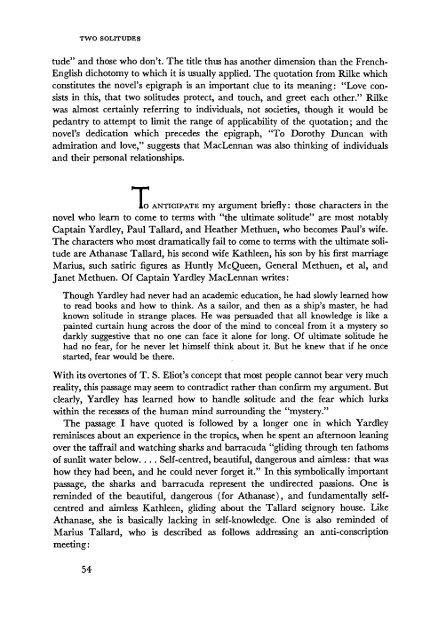A NEGLECTED THEME - University of British Columbia
A NEGLECTED THEME - University of British Columbia
A NEGLECTED THEME - University of British Columbia
Create successful ePaper yourself
Turn your PDF publications into a flip-book with our unique Google optimized e-Paper software.
TWO SOLITUDEStude" and those who don't. The title thus has another dimension than the French-English dichotomy to which it is usually applied. The quotation from Rilke whichconstitutes the novel's epigraph is an important clue to its meaning: "Love consistsin this, that two solitudes protect, and touch, and greet each other." Rilkewas almost certainly referring to individuals, not societies, though it would bepedantry to attempt to limit the range <strong>of</strong> applicability <strong>of</strong> the quotation; and thenovel's dedication which precedes the epigraph, "To Dorothy Duncan withadmiration and love," suggests that MacLennan was also thinking <strong>of</strong> individualsand their personal relationships.Τlo ANTICIPATE my argument briefly: those characters in thenovel who learn to come Ιο . to terms with "the ultimate solitude" are most notablyCaptain Yardley, Paul Tallard, and Heather Methuen, who becomes Paul's wife.The characters who most dramatically fail to come to terms with the ultimate solitudeare Athanase Tallard, his second wife Kathleen, his son by his first marriageMarius, such satiric figures as Huntly McQueen, General Methuen, et al, andJanet Methuen. Of Captain Yardley MacLennan writes :Though Yardley had never had an academic education, he had slowly learned howto read books and how to think. As a sailor, and then as a ship's master, he hadknown solitude in strange places. He was persuaded that all knowledge is like apainted curtain hung across the door <strong>of</strong> the mind to conceal from it a mystery sodarkly suggestive that no one can face it alone for long. Of ultimate solitude hehad no fear, for he never let himself think about it. But he knew that if he oncestarted, fear would be there.With its overtones <strong>of</strong> T. S. Eliot's concept that most people cannot bear very muchreality, this passage may seem to contradict rather than confirm my argument. Butclearly, Yardley has learned how to handle solitude and the fear which lurkswithin the recesses <strong>of</strong> the human mind surrounding the "mystery."The passage I have quoted is followed by a longer one in which Yardleyreminisces about an experience in the tropics, when he spent an afternoon leaningover the taffrail and watching sharks and barracuda "gliding through ten fathoms<strong>of</strong> sunlit water below. . .. Self-centred, beautiful, dangerous and aimless : that washow they had been, and he could never forget it." In this symbolically importantpassage, the sharks and barracuda represent the undirected passions. One isreminded <strong>of</strong> the beautiful, dangerous (for Athanase), and fundamentally selfcentredand aimless Kathleen, gliding about the Tallard seignory house. LikeAthanase, she is basically lacking in self-knowledge. One is also reminded <strong>of</strong>Marius Tallard, who is described as follows addressing an anti-conscriptionmeeting :54
















